
The Evolutionary Dynamics of the Microbial Symbioses of Cicadas
- Ewa Chrostek
- Suitable for: Staff and students with an interest in evolution, ecology and behaviour
- Admission: Free
Add this event to my calendar
Click on "Create a calendar file" and your browser will download a .ics file for this event.
Microsoft Outlook: Download the file, double-click it to open it in Outlook, then click on "Save & Close" to save it to your calendar. If that doesn't work go into Outlook, click on the File tab, then on Open & Export, then Open Calendar. Select your .ics file then click on "Save & Close".
Google Calendar: download the file, then go into your calendar. On the left where it says "Other calendars" click on the arrow icon and then click on Import calendar. Click on Browse and select the .ics file, then click on Import.
Apple Calendar: The file may open automatically with an option to save it to your calendar. If not, download the file, then you can either drag it to Calendar or import the file by going to File >Import > Import and choosing the .ics file.
Cicadas, like other sap-feeding hemipteran insects, depend for the production of essential amino acids and vitamins on specialized heritable microorganisms that inhabit their tissues. Two such endosymbiotic bacteria have co-diversified with cicadas for some 200 million years. I will explain how one of them, Hodgkinia, has repeatedly experienced a dramatic change in the genomic organization and function, with no known parallel outside of cicadas. In many cicada clades, this symbiont has fragmented into complexes comprising multiple genetically and cytologically distinct lineages. Individual Hodgkinia lineages may encode fewer than 20 total genes, but across all lineages present in a complex, nearly the complete set of the ancestral genes is present. This implies that the lineages rely on each other for the basic cellular functions, but also complement each other in producing the same nutrients as the single ancestral symbiont. I argue that the symbiont fragmentation is detrimental to the cicadas, decreasing biosynthetic efficiency and forcing adaptations to the maintenance and transmission of the symbiosis that are likely costly. This becomes more of a problem as the complexes fragment further over time, and these degenerative processes may ultimately lead to the extinction of the host lines. At least, unless the inefficient, degraded symbiont gets replaced by another microorganism and the degenerative cycle restarts.
